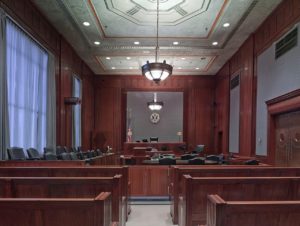Challenging Waivers of Right to a Jury Trial
Federal courts are obligated to error on the finding that a constitutional right has not been waived in a criminal case. This is true for a defendant's right to a jury trial. What is ordinarily a mundane issue of federal criminal procedure recently ended up generating an overturned conviction in a fraud case. In United States v. Laney, the Ninth Circuit Court of Appeals ruled that two defendants' fraud convictions had to be overturned because there was no evidence that they knowingly waived their right to a jury trial.
What Constitutes Waiver of a Defendant's Right to a Jury Trial

Right to a Jury Trial
Pursuant to Federal Rule of Criminal Procedure 23(a), "If the defendant is entitled to a jury trial, the trial must be by jury unless: (1) the defendant waives a jury trial in writing; (2) the government consents; and (3) the court approves." What typically happens in a criminal case is that the defendant signs a form waiving his right to a jury trial himself. Sometimes, this form may be signed by the defendant's counsel after consulting with the defendant, but there must be some other evidence that the court can point to that shows the defendant was involved in making a knowing and willing decision to waive a jury trial.
Background on United States v. Laney
In United States v. Laney, the defendants were convicted of implementing a scheme to defraud their employer, a concrete and construction company. The prosecution submitted a form to the court in advance of trial that indicated that all parties had agreed to no jury trial. The form waiving their right to a jury trial included the defendants' attorneys' electronic signatures, but the defendants never signed the form themselves. The decision was communicated to the prosecution on a conference call with the defendants' attorneys, but the defendants themselves were not on that call.
After the defendants were both convicted, but before sentencing, their attorneys appealed the conviction by arguing that there was not a voluntary, knowing and willing waiver of the defendants' right to a jury trial. The Ninth Circuit noted that the procedure in criminal matters was not followed and that it was unfortunate that the defendants did not simply sign the form themselves. Given that the defendants did not participate in the discussions with the government in which their attorneys confirmed their waiver of a jury trial, the appellate court could not find any evidence of voluntary waiver of their constitutional right.
Once the Ninth Circuit ruled that there was no proper waiver of the defendants' right to a jury trial, their fraud convictions had to be reversed due to structural error. The Supreme Court made clear in Neder v. United States that any finding of a structural error in a criminal case should result in "automatic reversal." Structural errors pertain to the fundamental rights of the defendant and affect the structure of the trial. The list of structural errors is a fairly short one, which is why it is much rarer for an appellate court to recognize a structural error than a harmless error.
The Potential Impact of United States v. Laney
The Ninth Circuit's ruling in United States v. Laney serves as a reminder that uncovering a potential structural error can be the holy grail of a federal criminal appeal. An ordinary aspect of a criminal trial, such as filling out a right to a jury trial waiver form, can be a potential source of automatic reversal if you know where to look. This highlights the importance of attention to detail in any criminal appeal, especially when it comes to uncovering often overlooked issues in the trial process. Attorney Brandon Sample has years of experience in analyzing all aspects of federal criminal trials to identify as many opportunities for a successful appeal as possible.
In addition, this case touches on the role that a defense attorney plays in informing clients of all aspects of the trial process. An experienced criminal defense attorney should take great care in instructing their clients on their constitutional rights in a criminal matter. This includes the decision to waive their right to a jury trial. If a defendant does not actively participate in some form of acknowledgment on the record that he willingly and knowingly waives his right to a jury trial, this may be sufficient to overturn a criminal conviction. United States v. Laney cautions defense attorneys to proceed with caution in pushing through a jury trial waiver form.
Recommended for you
MVRA Restitution And Loss Amount Inadequate, Eleventh Circuit Holds
United States v. Mitchell J. Stein : Mitchell Stein, a former attorney, challenged the district court’s loss and MVRA restitution determination in a mail, wire, and securities fraud prosecution arguing that the Government had failed to demonstrate both factual and legal causation for the loss amount.Using the same standard for Stein’s loss and restitution challenge,…
Career Offender Enhancement Cannot Be Based On Texas Possession With Intent To Distribute Conviction
United States v. Tanksley – Career Offender Enhancement : Dantana Tanksley was previously convicted in Texas under Section 481.112(a) of the Texas controlled substances act of possessing with intent to distribute a controlled substance. He was later enhanced as a career offender under federal sentencing guidelines. Under the federal sentencing guidelines, an individual can be…
Attorney Abandonment Claim Remanded For A Hearing
Mark Christeson filed a motion to re-open his habeas proceedings under Rule 60(b) arguing that his attorney’s failure to timely submit his 28 U.S.C. § 2254 petition (used by state prisoners but similar to a 2255) constituted attorney abandonment. The abandonment issue was key to resolving whether “extraordinary circumstances” existed to warrant granting Rule 60…




